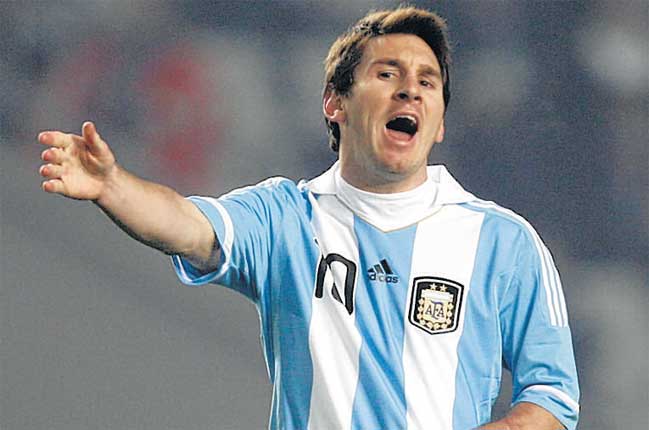Messi is slammed after Bolivia draw

Your support helps us to tell the story
From reproductive rights to climate change to Big Tech, The Independent is on the ground when the story is developing. Whether it's investigating the financials of Elon Musk's pro-Trump PAC or producing our latest documentary, 'The A Word', which shines a light on the American women fighting for reproductive rights, we know how important it is to parse out the facts from the messaging.
At such a critical moment in US history, we need reporters on the ground. Your donation allows us to keep sending journalists to speak to both sides of the story.
The Independent is trusted by Americans across the entire political spectrum. And unlike many other quality news outlets, we choose not to lock Americans out of our reporting and analysis with paywalls. We believe quality journalism should be available to everyone, paid for by those who can afford it.
Your support makes all the difference.The group stages of the Copa America, with only four of the 12 teams being eliminated, were supposed to be a glorified non-event, a chance for the big guns to ease themselves into the tournament and jockey for the easiest route to the final.
No more. After Argentina's draw with Bolivia, suddenly there is pressure on the host nation. As La Nacion put it: "The dream of seeing Tevez and Messi in the same team finished in huge disappointment, with serious questions for [the coach] Sergio Batista."
The pattern was all too familiar. Expectation leading to anxiety as chances failed to present themselves or were squandered, and then too many individuals trying to solve the problem themselves, abandoning cohesion as they did so. "We can't think we're going to win every game 5-0," said Carlos Tevez, which is fair enough, but when you're playing a side offered up as sacrificial lambs, a team who had only ever scored two goals in Argentina, you do expect to win.
You certainly do not expect to fall behind to a back-heel from Eduardo Rojas or to need a spectacular volley by Sergio Aguero to salvage a point, a quarter of an hour from time.
Batista spoke afterwards of how Argentina's play had been "too vertical" – a term popularised by Marcelo Bielsa to denote the habit of attacking too directly, in straight lines down the pitch. Lionel Messi, as so often with the national team, took most of the blame – "un desastre", as one fan put it in a furious post-match vox pop that was shown repeatedly on television.
When the line-ups were announced, it was notable that the cheer for Tevez's name was far louder than for Messi's. It is true that thelatter has never reproducedhis Barcelona form for the national team, but to holdhim solely accountableseems unfair.
Batista had spoken of trying to recreate the style of Barça, but to re-create in a fortnight in camp at Ezeiza a formula perfected over years of training seems a little like trying to write a best-selling and critically-acclaimed novel in a week. Besides which, the more Argentina try to look like Barça, the more apparent the differences become.
Argentina simply do not have the midfielders or the full-backs to ape the Barça approach. The number of potentially devastating through-balls Messi played that found their target either moving too soon and being offside, or too late and so being stifled by Bolivia's massed defence, showed how far they are from having Barcelona's mutual understanding.
After a traumatic week for Argentinian football that saw two fundamentals swept away – that River Plate could not be relegated and that the national team could not fail to beat Bolivia at home – pretty much the only thing that could lift the mood would be Brazil struggling against Venezuela today. Brazil too have changed coach since the World Cup, with Mano Menezes introducing a spirit of youthful adventure after the pragmatism of Dunga.
Milan's Alexandre Pato – described by Menezes as having the potential to be "the Ronaldo of this generation" – will start at centre-forward with Neymar, the explosive Santos striker who has been linked with a host of European clubs including Real Madrid and Chelsea, to the left. Robinho looks to have won the battle to start on the right.
A youthful Venezuela should be no match for such a side, but then everybody said that about Bolivia on Friday.
Join our commenting forum
Join thought-provoking conversations, follow other Independent readers and see their replies
Comments